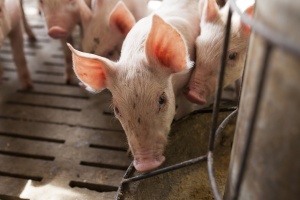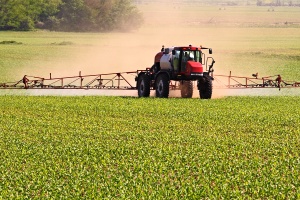Learning a Farmer’s Language
During my time with Illinois Farm Families, I’ve toured farms across the state of Illinois. I’ve interviewed grocers, moms, nutritionists, veterinarians, farmers, scientists and seed company representatives in an effort to understand how to feed my family. I’m trying to understand pricing policies and how food is grown. I’m concerned about keeping my family on the gluten-free, low-lactose diet that has helped us overcome a variety of health issues during the last four years while staying within our monthly grocery budget. I’m asking questions, and I’m learning from the answers.
A funny thing — the agricultural community has a language all its own, and it’s not unlike the rest of us when we get together with our own tribes. We talk about our children’s favorite cartoon characters or the upcoming PTO fundraiser or we talk in acronyms with work friends that no one else could possibly understand. Farmers have their own language, too. And sometimes the rest of us give words an entirely different meaning without learning the language.
Among the scariest words with regards to food production is Roundup resistance. But how many of us really know what that means? During the last several years, one of the ways crops have been genetically modified (GMO) is to be resistant to glyphosate, the synthetic compound in Roundup. Roundup is the most used broad spectrum herbicide in agriculture. A farmer, both conventional and organic, may use a chemical on his or her crop to ensure that he or she gets the highest yield possible. Roundup is the most widely used herbicide for a variety of reasons:
- It is highly effective when sprayed on a variety of weeds
- It is one of the safest substances used in agriculture [1]
- It is cheap
A Roundup Ready seed does NOT contain Roundup in its DNA. A Roundup Ready crop is Roundup Resistant. According to Tricia Braid of the Illinois Corn Marketing Board, it is made resistant by mimicking the petunia plant. Roundup resistance occurs naturally in the petunia, but crops such as corn and soybeans hadn’t figured it out yet. Thanks to biotechnology, scientists have taught those crops to do the same thing.And how do farmers feel about this? When I visited corn and soybean farmers Paul and Donna Jeschke in Mazon, Illinois, about 75 miles southwest of Chicago, I learned that farmers actually want the best seed technology available. According to Paul, biotech seed companies like Becks Hybrids, whom he purchases seeds from, have allowed farmers to use less fertilizers, pesticides and herbicides, thus decreasing carbon emissions from farm equipment while helping to guarantee the success of their crops in the midst of unpredictable weather, pests and weeds.
When fertilizers, pesticides and herbicides are used, they work best when applied in the right place, at the right time and in the right amounts. Modern tools like GPS guidance on sprayers and site-specific nozzles help farmers target applications to avoid over-spraying. (If you’ve ever explored the Farm Tech exhibit at Chicago’s Museum of Science and Industry, you know what I’m talking about!) And, since weed levels vary, farmers spray only when necessary. Conventional farmers in Illinois are required to attend annual trainings and be certified before spraying Roundup in their fields. Fortunately, it doesn’t take much to be effective. In fact, 95% of herbicide sprays are water.
Recently, Forbes Magazine listed farming as one of the top-10 most dangerous professions in the US. The US Bureau of Labor Statistics noted a 3% decline in the number of people in agricultural work in our country since 2012, the equivalent of 25,000 people. With the average age of a farmer in Illinois being 56 years old, less and less people are growing our food. Given the ever-increasing world population, it seems to me that GMO seeds present one opportunity to insure that every crop succeeds. And, according to the World Health Organization, “GM foods currently available on the international market have passed safety assessments and are not likely to present risks for human health. In addition, no effects on human health have been shown as a result of the consumption of such foods by the general population in the countries where they have been approved.”
Originally posted on Confessions of a Field Mom.











0 Comments